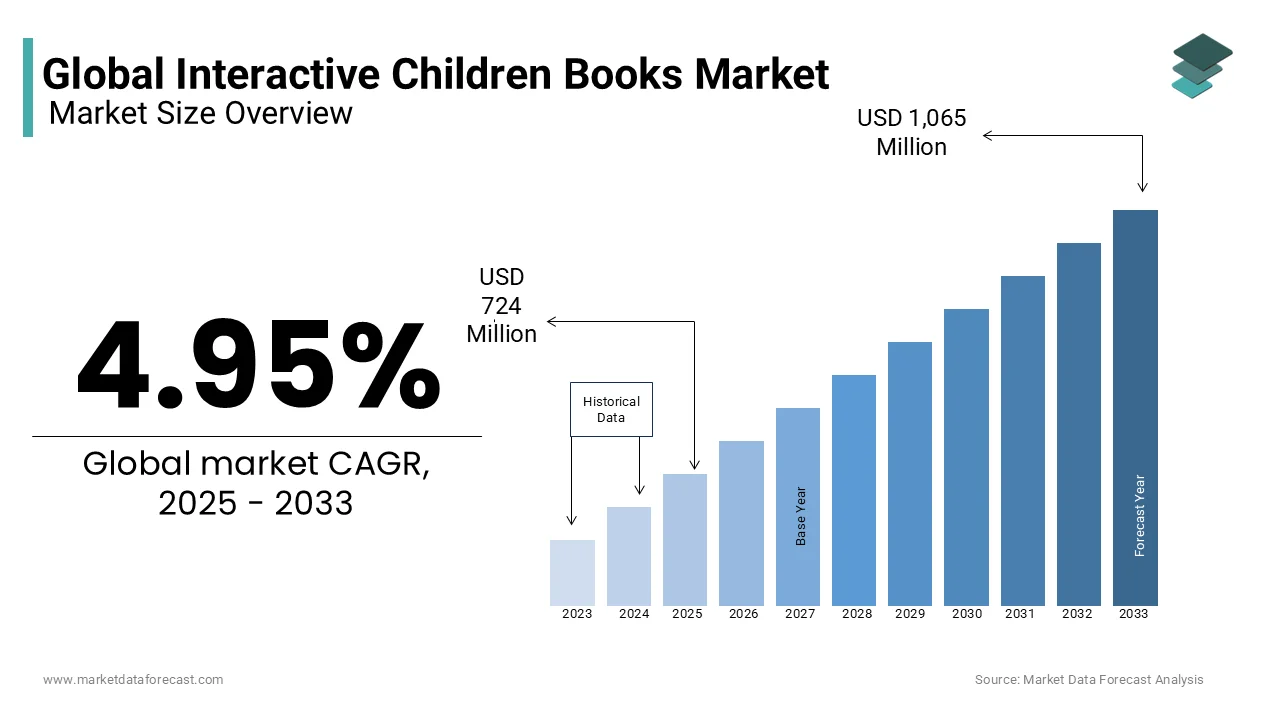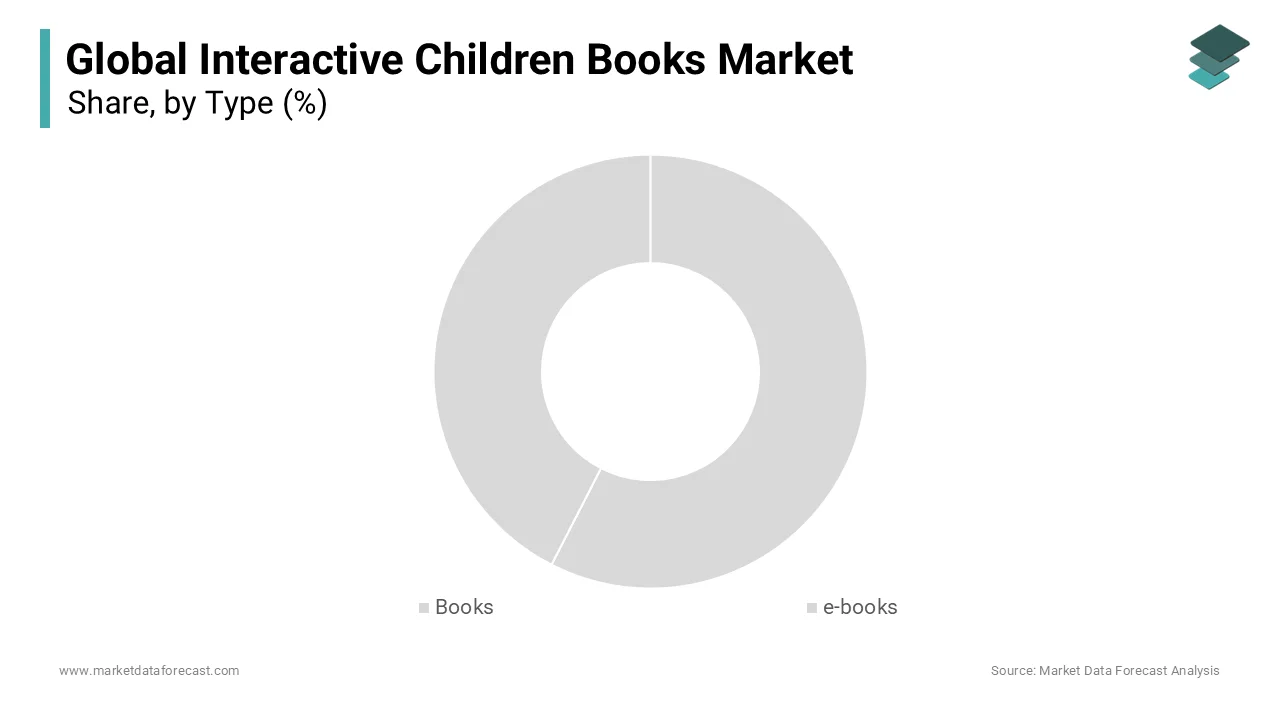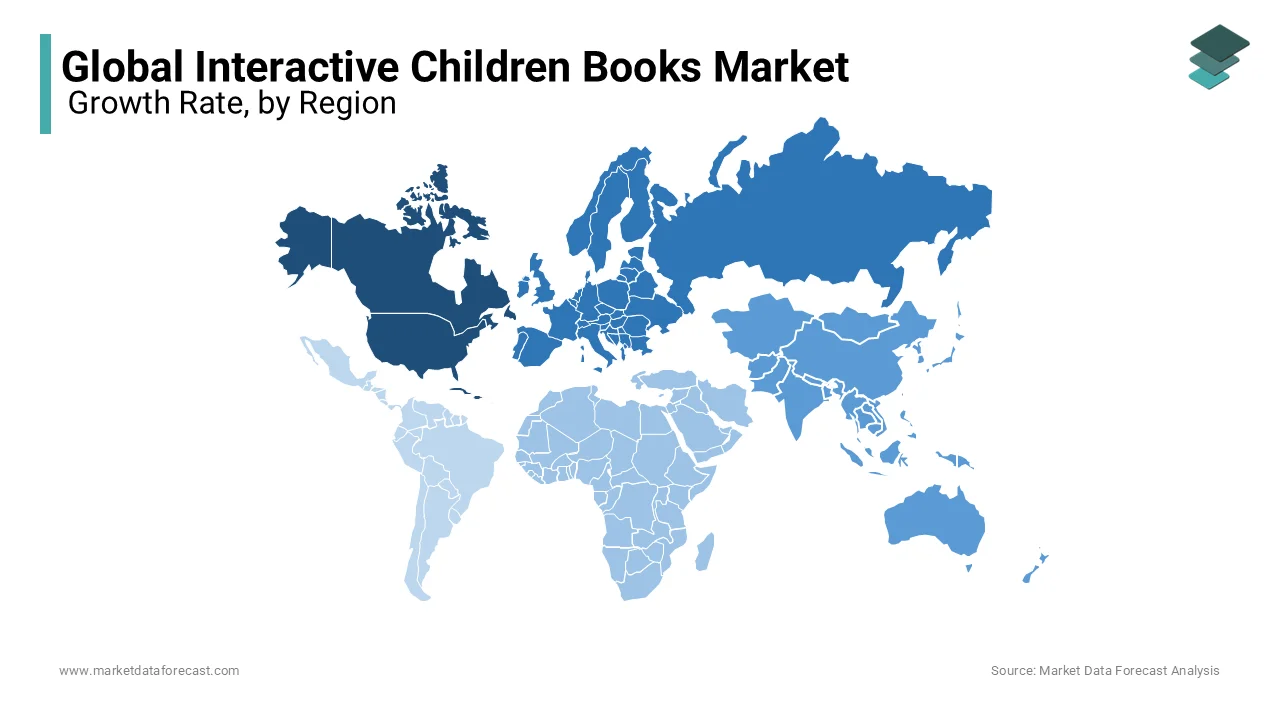Global Interactive Children Books Market Size, Share, Trends, & Growth Forecast Report By Type (Books, e-Books), Application (Baby-2, Ages 3-5, Ages 6-8, Ages 9-12), and Region (North America, Europe, Asia Pacific, Latin America, and Middle East & Africa), Industry Analysis From 2024 to 2033
Global Interactive Children Books Market Size
The size of the global interactive children books market was worth USD 690 million in 2024. The global market is predicted to reach USD 724 million in 2025 and USD 1,065 million in 2033, with a CAGR of 4.95% from 2025 to 2033.

In the interactive children books market, developing certain reading habits early helps children improve their creativity, vocabulary, and general productivity. Instilling reading habits at a dynamic, youthful age will also positively affect the youngster's performance at school. Children's literature is frequently intended to be read loudly either way otherwise in a series of readings.
A significant factor for using interactive books for kids is considering their age and developing needs to make something that will engage them during their excess time or in their playtime. For younger children (ages 0-24), use objects that are animal sounds or colors while including basic word acknowledgment skills so they can seem to understand the out-of-story events. More established children (ages 24-36) may appreciate further developed interactions by using factors that younger age likes to solve things, such as puzzles and guessing games.
MARKET DRIVERS
Developing Utilization of Interactive Books to Build Literacy
The developing utilization of interactive books to build literacy at an early age among children is a significant factor driving interest in the global interactive Children's books market in focus. With the rising number of children battling to read, the significance of early literacy has expanded. Empowering children to develop reading habits early helps them improve their literacy, creativity, and vocabulary. It likewise helps language learning abilities. Accordingly, guardians, educators, and schools progressively put effort and resources into interactive children books.
Books Specially Designed for Children
Interactive Children's Book for Children is a classification of books specially designed for children to encourage them to understand more without getting exhausted. Various varieties of these books are accessible in the market, shifting from texturized to those with special devices, which are used to assist children with developing and grasping information interestingly. Interactive books also possess these qualities, yet they are more interactive by including extra elements such as sound effects and music that come alive with readers' interaction. These additions create an immersive encounter for children, who can interface with the storytelling process through physical responses on numerous levels.
In addition, these books further develop innovativeness and permit children to utilize their creative minds and improve their general vocabulary and productivity. Nevertheless, the expanding advantages of reading books since the beginning are adding to the development of the global interactive children book market during the forecast period.
MARKET RESTRAINTS
Wastage of Paper which Effects the Planet
Because of traditional books, a lot of paper is getting wasted, which has a severe effect on the planet as this may lead to many bad things where Mother Nature is affected by these traditional books. Due to recent technological developments, the reading of books has been decreasing because youth have been using audiobooks, otherwise called e-books. These audiobooks are audio clippings where a voice reads the book, and due to this, the regular handbooks are decreasing in number.
REPORT COVERAGE
|
REPORT METRIC |
DETAILS |
|
Market Size Available |
2024 to 2033 |
|
Base Year |
2024 |
|
Forecast Period |
2025 to 2033 |
|
CAGR |
4.95% |
|
Segments Covered |
By Type, Application, and Region |
|
Various Analyses Covered |
Global, Regional & Country Level Analysis, Segment-Level Analysis, DROC, PESTLE Analysis, Porter’s Five Forces Analysis, Competitive Landscape, Analyst Overview of Investment Opportunities |
|
Regions Covered |
North America, Europe, APAC, Latin America, Middle East & Africa |
|
Market Leaders Profiled |
Amazon, Pearson, Reed Elsevier, Thomson Reuters, Wolters Kluwer, Random House, Hachette Livre, Grupo Planeta, McGraw-Hill Education, Holtzbrinck, and others. |
SEGMENTAL ANALYSIS
By Type Insights
Based on the type of the interactive Children books market, the traditional books are anticipated to help the growth of the market. The book market refers to the ordinary paper-based storybooks sold in a bookstore or other retail stores. These books include fiction and non-fiction titles, with sound effects essential to storytelling. Books include printed books such as soft cover, hardcover, and board books. These are the traditional type of Children literature that has been around since the eighteenth century.

By Application Insights
Based on the application, every stage has its own thing. But here, the 6-8 and 9-12 age groups are anticipated to observe more significant growth in the market. For children aged six to eight, interactive books are most regularly used to draw in them with text and sounds that might be more complex or demanding. This book commonly has features like puzzles, guessing games, and secret objects.
Books for children in the 9-12 age groups can contain a greater degree of hardness and intelligence, for instance, using puzzles or intuitive elements. The objective is to engage older kids with seriously demanding text that more youthful readers may not quickly grasp.
REGIONAL ANALYSIS
North America is one of the most exceptional regions regarding interactive book usage, with children spending an average of seven hours weekly using digital apps. This region also has a more significant level of smartphone and tablet ownership among youth.

Europe leads the world second in electronic books. However, these types regularly contain less intelligence than those found because cultural differences emphasize customary storytelling methods over entertainment.
The Asia Pacific region had little growth due to technical limitations such as lower web speeds or the absence of accessibility of smartphones to younger youth.
The Middle East and Africa region are less evolved regarding interactive books because of low access rates on cell phones and lack of web speeds.
KEY MARKET PARTICIPANTS
Companies playing a major role in the global interactive books market include Amazon, Pearson, Reed Elsevier, Thomson Reuters, Wolters Kluwer, Random House, Hachette Livre, Grupo Planeta, McGraw-Hill Education, Holtzbrinck
RECENT HAPPENINGS IN THE MARKET
-
August 13, 2018: McGraw-Hill Education declared last week that it has reached "a few new achievements in its extended 'Moderateness and Outcomes' program," which different projects stress setting aside understudies cash and giving them better outcomes.
MARKET SEGMENTATION
This research report on the global interactive children books market has been segmented and sub-segmented based on the type, application and region.
By Type
-
Books
-
e-books
By Application
-
Baby-2
-
Ages 3-5
-
Ages 6-8
-
Ages 9-12
By Region
-
North America
-
The United States
-
Canada
-
Rest of North America
-
-
Europe
-
The United Kingdom
-
Spain
-
Germany
-
Italy
-
France
-
Rest of Europe
-
-
The Asia Pacific
-
India
-
Japan
-
China
-
Australia
-
Singapore
-
Malaysia
-
South Korea
-
New Zealand
-
Southeast Asia
-
-
Latin America
-
Brazil
-
Argentina
-
Mexico
-
Rest of LATAM
-
-
The Middle East and Africa
-
Saudi Arabia
-
UAE
-
Lebanon
-
Jordan
-
Cyprus
-
Frequently Asked Questions
What are the key trends influencing the interactive children's books market worldwide?
Current trends include the integration of augmented reality (AR), personalized learning experiences, and eco-friendly materials in interactive children's books.
How are digital platforms impacting the interactive children's books market share?
Digital platforms are gaining traction, with e-books, interactive apps, and online platforms contributing significantly to the market share, offering engaging and accessible content.
What age groups are targeted by interactive children's books, and how does it impact market dynamics?
Interactive children's books cater to various age groups, from toddlers to pre-teens. The diversified target audience leads to a broader market scope and increased demand for age-appropriate interactive content.
How do educational institutions contribute to the growth of the interactive children's books market?
Increasing adoption of interactive books in schools and educational institutions to enhance learning experiences is a significant driver, fostering market growth and innovation.
How is the rise of sustainability impacting the production and consumption of interactive children's books globally?
Growing environmental consciousness is driving the adoption of sustainable materials in interactive children's books, influencing production practices and consumer preferences for eco-friendly options.
Related Reports
Access the study in MULTIPLE FORMATS
Purchase options starting from $ 2500
Didn’t find what you’re looking for?
TALK TO OUR ANALYST TEAM
Need something within your budget?
NO WORRIES! WE GOT YOU COVERED!
Call us on: +1 888 702 9696 (U.S Toll Free)
Write to us: sales@marketdataforecast.com